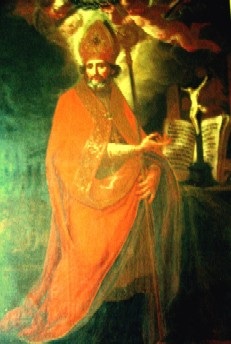
The year following, the Council met at Milan, and Eusebius, by the invitation of the Emperor, and the desire and command of the Papal Legates, attended. Here the Arians, assembled in a perfect synagogue of Satan, and all furiously raging together against holy Athanasius, found Eusebius one of the stoutest enemies of their faction. As soon as he entered the Council, he delivered a long harangue, wherein he remarked that, of those there gathered together, some were notoriously defiled with heresy, and therefore he proposed that everyone should first of all subscribe the Nicene Creed, before proceeding to any other business. The Arians, in a violent passion, refused, whereupon he on his part refused to subscribe any proceedings against Athanasius, and even skilfully procured the withdrawal of the signature of the holy martyr Denys, then Bishop of Milan, which they had lyingly procured by practising on his simplicity. The Arians were now entirely enraged, and, after many persecutions, procured a decree of banishment against Eusebius. The Saint shook off the dust of his feet against them, and, defying alike the threats of Caesar and the drawn swords of the soldiery, accepted the sentence as one of the dignities of his office. He was sent to Bethshan in the Holy Land, suffering hunger, thirst, stripes, and all manner of violence, but for the Faith's sake he despised this life, and feared not death, but freely delivered his body to the tormentors.
He wrote a solemn letter from Bethshan, addressed to the clergy and people of Vercelli and that neighbourhood, full of constancy, devotion, and piety, describing the frightful cruelty and brazen impudence of the Arians. From this letter we know how completely they failed to scare him by their threats and their inhuman brutality, or to seduce him by their serpent-like cunning into receiving their communion. In consequence of his unshaken resolution, he was moved from Bethshan into Cappadocia, and then again, to the deserts of Upper Egypt. He suffered exile until the death of Constantius, after which he was allowed to return to his flock. First, however, he took care to attend the Council at Alexandria, called to heal the wounds of the Church, and, afterwards, like a skilful physician, he made a progress through all the provinces of the East, strengthening those that were weak in the Faith, and confirming them in Christian doctrine. Then, with the same healthful results, he passed through Illyricum into Italy, who, at his coming, laid aside her garments of mourning. After his return, he published an expurgated edition of Origen's Commentary on the Psalms, and likewise of the works of Eusebius of Caesarea, both which he translated from Greek into Latin. At length, distinguished by all these great works, he passed to that crown of glory which fadeth not away, promised to them who suffer for the truth. He departed this present life at Vercelli in the reign of Valentinian and Valens.





